Results-based regulation: theoretical and educational assumptions reading coupled with a World Bank’s document
DOI:
https://doi.org/10.5902/1984644440558Keywords:
Human formation, Educational assumptions, Results-based regulationAbstract
The study aims to think over theoretical and educational assumptions in parallel to results-based regulation. Modern and contemporary assumptions are highlighted, besides addressing a World Bank’s document in order to perceive the tone of assumptions made by that organization which interferes in human development. About the methodological procedures, choice of document is also linked to a bigger research in process, in which results-based regulation is discussed. We consider assumptions of modernity obscure fragmentation of knowledge under specialization. On the other hand assumptions of contemporaneity invite us to have other thoughts and it is an opportunity of resisting to the servitude and human deformation logic and additionally, that prospect is able to improve investigative experiences with other thoughts. About the document, business speech is predominant whose tone indicates modern assumptions. Thus, translating knowledge in measurable results is a key concern of the agency and it preserves the capitalist relations of production.
References
AGAMBEN, Giorgio. Profanações. São Paulo: Boitempo, 2007.
BEHRING, Elaine Rossetti. Brasil em contra-reforma: desestruturação do Estado e perda de direitos. São Paulo: Cortez, 2003.
CARNOY, Martin. Estado e teoria política. 6. ed. Campinas, SP: Papirus, 2000.
DALE, Roger. Globalização e educação: demonstrando a existência de uma “Cultura Educacional Mundial Comum” ou localizando uma “Agenda Globalmente Estruturada para a Educação”? Educação e Sociedade., Campinas, v. 25, n. 87, p. 423-460, maio/ago. 2004.
DARDOT, Pierre; LAVAL, Christian. A nova razão do mundo: ensaio sobre a sociedade neoliberal. São Paulo: Boitempo, 2016.
HARVEY, David. O neoliberalismo: história e implicações. 2. ed. São Paulo: Edições Loyola, 2011.
GAMBOA, Silvio Sanchez. Pesquisa Qualitativa: superando tecnicismos e falsos dualismos. Contrapontos, Itajaí, v. 3, n. 3, p. 393-405, set./dez. 2003.
LIBÂNEO, José Carlos. As teorias pedagógicas modernas revisitadas pelo debate contemporâneo na educação. 2005. Disponível em: https://www.fclar.unesp.br/Home/Graduacao/Espacodoaluno/PET-ProgramadeEducacaoTutorial/Pedagogia/capitulo-libaneo.pdf. Acesso em: 11 jul. 2019.
MATURANA, Humberto; VARELA, Francisco. A árvore do conhecimento: as bases biológicas do entendimento humano. Campinas, SP: Editorial Psy II, 1995.
MATURANA, Humberto; VARELA, Francisco. De máquinas e seres vivos. Autopoiese: a organização do vivo. Porto Alegre: Artes Médicas, 1997.
MORIN, Edgar. Ciência com consciência. 8. ed. Rio de Janeiro: Bertrand Brasil, 2005. p. 175-194.
PRIGOGINE, Ilya; STENGERS, Isabelle. A nova aliança. 3. ed. Brasília: Editora UnB, 1997. p. 19-41.
SANTOS, Boaventura de Souza. Um discurso sobre as ciências. 5. ed. São Paulo: Cortez, 2008.
SCHAFF, Adam. História e verdade. São Paulo: Martins Fontes, 1995. p. 65-98.
STEDEROTH, Dirk. Formação ajustada: sobre a capitalização do humano na formação e sua administração total. Espaço Pedagógico, Passo Fundo, v. 24, n. 3, p. 487-507, set./dez. 2017.
WORLD BANK. Education Sector Strategy: World Bank Human Development Network. Washington, DC, 1999. Disponível em: http://documents.worldbank.org/curated/en/406991468178765170/Education-sector-strategy. Acesso em: 11 jul. 2019.
Published
How to Cite
Issue
Section
License
Declaration of originality
We declare that all articles present in the journal Educação (UFSM) are originals and were not submitted for publishing on any other publication, as a whole or a fraction. We also declare that, after being published by Educação (UFSM), a paper will not be submitted to another journal within two years. After this time, our journal transfers the publishing rights to the authors, with a permit granted by the Editorial Council.
We also acknowledge that the originals’ submission to Educação (UFSM) implies on a transference of copyright for physical and digital publishing to the journal. In case of noncompliance, the violator will receive sanctions and penalties predicted by the Brazilian Copyright Protection Law (n. 9610, dated 19/02/98).
Attribution 4.0 International (CC BY 4.0)
This license lets others remix, transform, and build upon the material for any purpose, even commercially, and copy and redistribute the material in any medium or format.

This work is licensed under a Creative Commons Attribution 4.0 International (CC BY 4.0)






